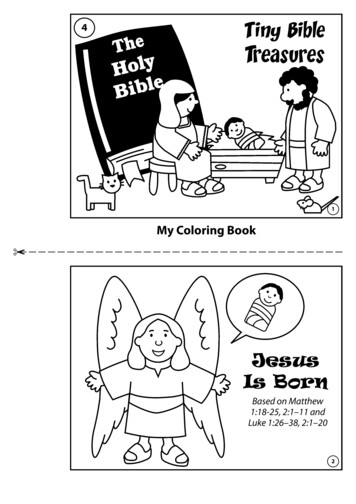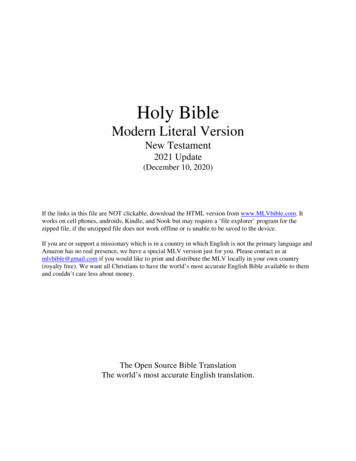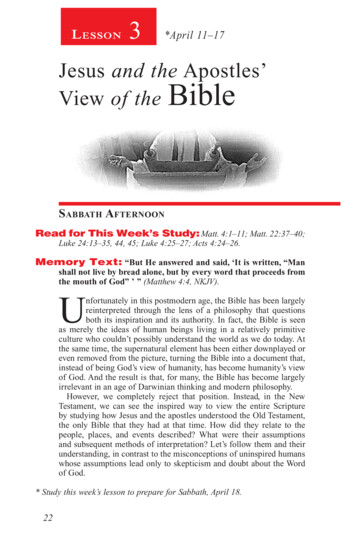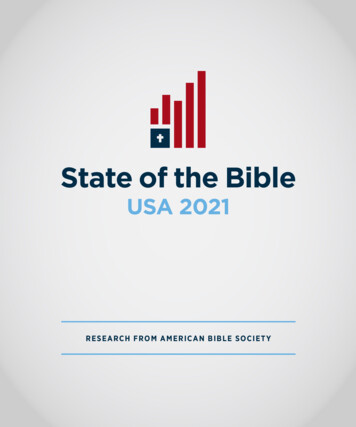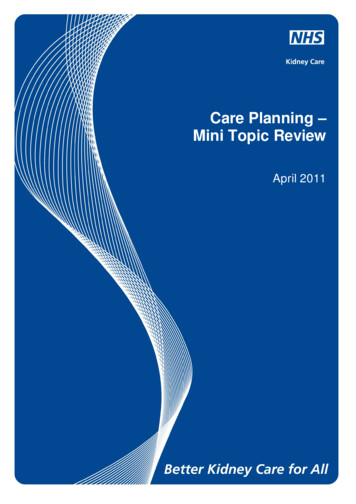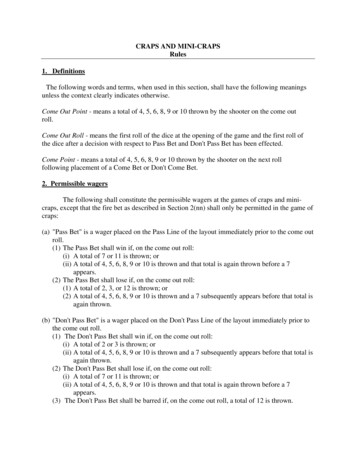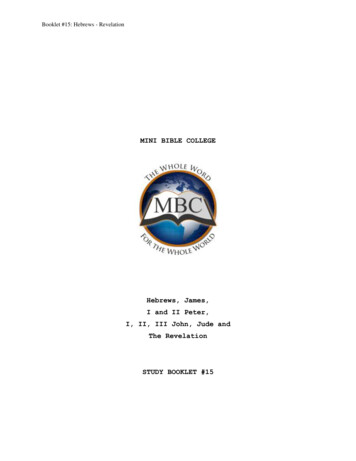
Transcription
Booklet #15: Hebrews - RevelationMINI BIBLE COLLEGEHebrews, James,I and II Peter,I, II, III John, Jude andThe RevelationSTUDY BOOKLET #15
Booklet #15: Hebrews - RevelationChapter 1The Book of HebrewsWe have now finished surveying the letters of the ApostlePaul and we are approaching the General Epistles, so calledbecause these letters were addressed to general, rather e do not know who wrote this book.TheBookofPaul has beensuggested, but the first word in this letter is not "Paul" as holars do not believe Paul wrote the Book of Hebrews.As we have seen so far in our survey of the Bible, theimportant thing about any book in the Bible is this: “What doesthe book say?”“What does that mean?” and “What does that meanto you and me?”The important thing about the Book of Hebrewsis the truth that is taught in it and the personal applicationof that truth to your life and derstood what the Old Testament and the New Testament had tosay about Jesus Christ.thatmorethananyThe primary contribution of the book isotherbookofthetogether the Old and the New Testaments.Bible,HebrewstiesHave you ever wonderedwhy we no longer offer animal sacrifices for our sins?Thisbook will answer that question and many other questions likethat one.The Argument of the Book of HebrewsAs you read Hebrews, realize that this book has an argumentthat is presented with profound logic from the first verse tothe last.Try to follow the inspired logic of the author as youread this book.Try to read the book in one sitting if you can1
Booklet #15: Hebrews - Revelationblock out the time to do that.As you read, looking for hisargument, make the observation that there are three words thatcan guide you.The first word is "better," the second word is"believe" and the third word is "beware."The author is writing to Jews and he wants them to realizethat Jesus Christ is better than all the things they revere.Hewill essentially write, “You cherish the prophets, but JesusChrist is better than the prophets.Jesus is the Prophet.Godhas spoken through prophets but now God has spoken through HisSon.His Son is better than all the prophets.In the first two chapters of this book, the author pointsout that Jesus Christ is better than angels.conservativeandorthodox,liketheThe Jews who werePharisees,believedinangels.The Jews also revered Moses, so he writes that Jesus Christis better than Moses.The author gives us this word picture: Ahouse has value, but the builder of a house is of more valuethan the house.Moses built the house, the Hebrew nation, butJesus Christ is the Son Who lives in that house.Then the author argues that Jesus Christ is better thanJoshua who led the children of Israel into the Promised Land andgave them rest.Jesus, however, gave them a rest that farexceeds the rest they received when they entered the PromisedLand.Then he argues that Jesus Christ is better than all theirpriesthoods.These Jews valued their priesthoods.Beginning inchapter five, he argues that Jesus Christ is better than allthose priesthoods.After the priesthoods, he refers to the covenants.was a covenant with Noah, Abraham, Moses, and David.ThereGod mademany covenants, but the author argues that Jesus is better thanall those covenants.2
Booklet #15: Hebrews - RevelationFinally, the author of Hebrews makes reference to the tentof worship in the wilderness.You may remember that the templeof Solomon was built on the same pattern as the tent of worshipthey used while they were wandering in the wilderness.As wemight expect, the author argues that Jesus Christ is better thanthe Tent of Worship.thatTentofHe writes to his Jewish readers, rns of worship that were there, were just a copy, just avisible expression of a heavenly worship tent that exists inheaven, a worship tent not made with hands.” (Hebrews 9:11,2326)Once a year, the high priest would go into the inner tentthat was called the "Holy of Holies."He would take sacrificialblood into the Holy of Holies where he offered that blood forthe sins of all the people.All of this was a pattern of whathappened in heaven when Jesus Christ died on the cross.It wasas if He was the Great High Priest and interceded for the sinsof the whole world with His own precious blood.His sacrificefulfilled and validated all those animal sacrifices that wereofferedtoGodthroughpriestsandwhich existed from Moses to Jesus.thatsacrificialsystem,This author ties the twotestaments together when he writes that after Jesus died on thecross, there should be no more sacrifices offered for our sins.Chapter 2You’d Better Believe It!The next two key words are “believe” and “beware.”Theauthor gives many warnings about the subtlety of apostasy-taking a stand at one point in your journey of faith and thenlater, to take another stand away from your original position.3
Booklet #15: Hebrews - RevelationThe author’s concept of apostasy is not so much that of a httheology and does not do anything about it.Hebrews is filled with exhortations and warnings.Anotherword that often accompanies these warnings is the word "lest"sometimes expressed as – “so that” or “in case” (Hebrew 2:1,3:13, 4:1, 11).Many of the warnings relate to the work ofChrist in us, or with the work of Christ through us.Theexhortations in Hebrews frequently follow the words "let us”.(Hebrews 4:1, 11, 10:22, 23, 24)As you read Hebrews, consistently try to focus the argumentof the book.understandtheWhen you understand that argument, you will alsomissionoftheBookofHebrews,whichistoencourage Jewish believers who were suffering, discouraged tothe point that they were about to throw away their faith.Hismission objective was also to encourage Jewish people who hadnot yet placed their faith in Jesus to step across the line andmake a real commitment of faith.While he is addressing thosewho had not yet come to authentic faith, he obviously wants tostrip away false assurance from those who had not yet made agenuine commitment of faith.The author’s warnings continue as he focuses an event inHebrew history that is recorded in the fourteenth chapter ofNumbers.When the children of Israel wandered in the wildernessfor forty years, ten times God challenged them to believe Him byperforming miracles for them.He was trying to give them thefaith to invade the fortified cities of Canaan.God reached the point with that generation where in effect,He said, "I have had it with you.the Promised Land.aregoingtoenterYou are never going to enterThe only two men from among all of you whothebecause they believed Me.”PromisedLandareJoshuaandCalebThe author warns them not to imitate4
Booklet #15: Hebrews - ntotheirspiritual Promised Land, which he calls “rest.” (Hebrews 3:74:1)In chapters three and four, the author in essence writes:"If you can still hear the voice of God but you will not listento it, you are just like those people in the wilderness who wentaround in circles for forty years.The day will come when youwill not hear the voice of God anymore.youandyouwillfailtoenterintoGod will turn away fromthePromisedLandofabundant living in Christ because the voice will get quieter andquieter."In chapter five, the author wants to address a subject thatis very difficult to understand.He is about to show that JesusChrist is better than all the previous priesthoods.Jews wouldexpect the author to show that Jesus was a priest of the orderof Aaron or Levi.To begin his presentation, he wants to makethe point that Jesus is a special priest from the order ofMelchizedek.At that point, he puts a parenthesis in place and writes,“I would like to tell you more about Melchizedek, but I cannot.”Within his parentheses, he laments the fact that they have notgrown in their understanding of Scripture to the point that theywould understand what he wants to tell them about Melchizedek.He profiles the kind of spiritual diet they need to grow upspiritually. (Hebrews 5:11-14)When you go to church, your pastor, who has digested somespiritual food from the Scriptures,spiritually digested.teaches you what he hasThat is like drinking milk, which is apredigested food for babies who have not yet develop a digestivesystem of their own.If the only Scripture you know comes toyou through a pastor who has predigested that Scripture thatmakes you a spiritual baby.5
Booklet #15: Hebrews - RevelationHowever, if you come to the Scripture alone, if it is onlyyou, the Holy Spirit, and the Bible, and the Holy Spirit teachesyou out of the Scripture, you are now eating spiritual meat foryour spiritual nourishment.According to the Apostle John, as a result of your beingborn again, Christ has come to live in your heart.received an “anointing” from the Holy Spirit.realize thatYou haveJohn wants you to"You need not that any man teach you because theanointing that is in you can teach you everything you need toknow." (I John 2:2-27)The sixth chapter of Hebrews has some verses that havetroubled devout souls for many centuries (Hebrews 6:4-12).Somebelieve this passage is teaching that we as true believers canlose our salvation.ofbettersalvation."andthingsI disagree.concerningyou,He writes: "We are confidentyes,thingsthataccompanyWhen he writes about being enlightened, rienced regeneration – the “new birth”.whohasHe is describingthe person who is being enticed by the Holy Spirit to the pointthat they taste, or partake, but they have not really steppedacross the line of faith and been born again.I remind you again that one of the objectives of this bookis to exhort Jews, who have not yet trusted Jesus Christ, tomake a definite commitment of faith in Christ.The purpose ofthe argument of this book is to challenge them to stand up andsuffer with Jesus Christ, to come out and make an beassuredoftheirI believe that is the objective of the message ofthis very difficult exhortation in the sixth chapter of the Bookof Hebrews.Chapter six, verses four to six, must be interpreted in thecontext of the total argument and mission objective of the Book6
Booklet #15: Hebrews - Revelationof Hebrews.According to the author he is not addressing thingsthat accompany salvation.His exhortation throughout the bookis directed to professing believers who have not yet been bornagain because they are stopping short of saving faith in theircommitment to Jesus Christ.The author is warning these peoplethat they are like those who go to a marketplace and look - andlook - and look, but never buy anything.His warning here inthis passage is that an egg reaches a point where it eitherhatches, or it becomes a rotten ews wants for his readers is for them to be born again.pointinthisdifficultpassageisthatagain, they will not lose their esuchaoncetheyareofHisbornBut before the newthingasaspiritualThese people are in danger of being “aborted”while they are in a period of spiritual “gestation”.Chapter 3Focus on FaithThe real heart of this author’s message is found in theeleventh chapter of the book.The eleventh chapter of the Bookof Hebrews is known as the "faith chapter" of the Bible.Thechapter actually begins near the end of the tenth chapter whenhe begins to give his readers a cluster of reasons why theyshould not throw away their faith (Hebrews 10:35).He writesthat they should not throw away their faith because faith hadsaved them.He exhorts them to think back to that time whenthey first believed and were saved.This is the thrust of hisargument - do not throw away your faith because your faith hassaved you!7
Booklet #15: Hebrews - RevelationThey had apparently experienced an authentic conversion toChrist that was accompanied by a fervent first love for Christ.He reminds them of that experience, how they had endured theloss of all things, knowing that in heaven they had a betterreward.Now, the author is saying, think back to that initialexperience of faith and salvation and think of what it meant toyou.Realize that you were saved by your faith.Therefore,whatever you do, do not throw away the faith that saved you.Then, in verse thirty-eight of chapter ten, he quotes theprophet Habakkuk, "The just shall live by faith." (Habakkuk 2:4)In this context, he essentially writes: "You can’t throw awayyour faith because you are going to need your faith.You arenot only saved by faith; you must live by faith."Faith is very difficult to define, but you can describe it.He writes: "Faith is the substance of things hoped for, tsomething good exists in this world and someday you are going tointersect that good.the good.Old Testament believers referred to seeingDavid challenged failures and fugitives with thisquestion: "Who is the man who desires life, and loves many days,that he may see good?"He then answered his own question byissuing this invitation: "Oh, taste and see that the Lord isgood; blessed is the man who trusts in Him!" (Psalm 34:12, 8)For faith to be faith, there has to be some evidence to supportthe conviction that something good is going to happen.But here, the context of the argument is “Don’t throw awayyour faith because of what faith is.Faith is the substance ofyour hopes or the foundation that makes your hopes believable.Faith is the evidence of things not seen, that is, the unseenobject of your faith.When your faith is biblical faith, the object of your faithmust be unseen.You eliminate the need for faith when you have8
Booklet #15: Hebrews - Revelationand can see the object of your faith.When faith is biblicalfaith, the object of your faith is unseen, but there is evidencethat supports the conviction that the unseen object is there.It is like the aroma of a favorite meal that you have not yetseen, but the aroma is evidence that the meal is about to beserved.Therefore, a good definition of faith might be: "Faithis an act of belief in something, or Someone, you cannot see,which is based on evidence."In this case, the unseen object is God.And the author issaying that the greatest evidence in the world that there is ent, faith is the gift of God. (Ephesians 2:8; Philippians1:29)Therefore, the one who has faith is the greatest evidenceon earth that the Giver of faith exists.He writes, “Faith isthe substance of things hoped for, the evidence of things notseen.”isAmong other things, the writer of this profound tdemonstrates the existence of the unseen God.He gives his readers yet another reason why they should notthrow away their faith when he writes: "Without faith it isimpossible to please Him, for he that would come to God mustbelieve that He is and that He is a rewarder of them thatdiligently seek Him." (Hebrews 11:6)Hold on to the logic of his argument, which is all thereasons why they should not throw away their faith.He ismaking the point that they should not throw away their faithbecause without faith they cannot come to God, or please God.He then tells them (and us) about people who pleased God becausethey had faith.Enoch was such a man who was taken because of his faith.It’s as if Enoch walked so close to God that one day God said toEnoch, "Enoch, we are a lot closer to My house now than we are9
Booklet #15: Hebrews - Revelationto yours; why don't you just come on home with Me?"God justtook Enoch home to heaven because Enoch walked with God andpleased God (Hebrews 11:5).Then, he gives examples of godly people who had faith.Gothrough Hebrews chapter eleven and underline all the verbs, thewords of action.did something.Someone,orAll of them were heroes of faith because theyThat is why I say faith is an act of belief n God commissioned Noah to build an ark, it had not yetrained on earth.This author describes that challenge to Noah’sfaith as, "Things not seen as yet."Noah had never seen rain.The story of Noah, which covers four chapters in the Book chapter: "By faith Noah, being divinely warned of things not yetseen, moved with godly fear, prepared an ark for the saving ofhis household, by which he condemned the world and became heirof the righteousness which is according to faith." (7)Noah was a preacher of righteousness during the 120 yearshe spent building the ark.to be in that ark.salvation.The only way you could be saved wasPeter tells us that the ark is a picture ofIn this chapter we are told that Noah is a pictureof faith and of what faith can mean and of what faith can do.Many people believe the metaphor the author presents in12:1-2 is that we are the athletes running in a race while aThey have already run their race.greatcloudofDo you believeit is possible that people who are deceased, those who have goneon before us, know what is happening in our lives today?Theauthor of Hebrews may be adding to his argument here in thefaith chapter, that we should not throw away our faith because a10
Booklet #15: Hebrews - Revelationgreat cloud of witnesses is watching and cheering us on as werun our race of bey Him, He will correct you.According to this author, uffering is an affirmation of your being a son (or a daughter)of God.He writes: "Do not despise the chastening of God.Whenyou are chastened by God, that only proves that you are Hischild.Chastening will result in your becoming a partaker ofHis holiness."The author also tells us that chastening yieldsthe peaceable fruit of righteousness.The author closes this profound document exhorting us to behospitable.He writes in his last chapter, "Entertain strangersbecause some have entertained angels unawares."Then he tellsus to remember the prisoners as if we were in prison with them.Many of the early church members were in prison.The authoralso closes this masterpiece with an exhortation to obey thosespiritual shepherds who are responsible for our spiritual wellbeing.Chapter 4The Letter of JamesThe Epistle of James is intensely practical, referred to earunning commentary on the teachings of Jesus Christ, especiallythe Sermon on the Mount.You can find at least ten exampleswhere specific teachings of Jesus are amplified and applied byJames.Many scholars believe that the James who wrote this didnot
Booklet #15: Hebrews - RevelationbelieveinJesuspublic ministry.whileJesuswashavingHisthreeyearsofAfter the resurrection, we are told that Jesusmade a special appearance to Peter and James, this James, Hisearthly brother (I Corinthians 15:7).It is intriguing to observe that after James was s of the New Testament church.oneofthegreatJames is the one whopresides over that council at Jerusalem described in Acts 15.This is the James that the apostle Paul refers to in hisletter to the Galatians when he writes that when he went up toJerusalem, there were three men who seemed to be pillars in theJerusalem church - John, Peter and this James.Tradition tells us James was thrown from the pinnacle ofthe temple and then clubbed to death by the high religiouscommunity revolted against the high priest and ran him out ofoffice.When the Roman emperor, Titus, destroyed Jerusalem, in70 A.D. many of the devout Jews, who did not become followers ofJesus, believed that it was a judgment of God upon the city forthe mart
MINI BIBLE COLLEGE Hebrews, James, I and II Peter, I, II, III John, Jude and The Revelation STUDY BOOKLET #15 . Booklet #15: Hebrews - Revelation 1 Chapter 1 The Book of Hebrews We have now finished surveying the letters of the Apostle Pa

